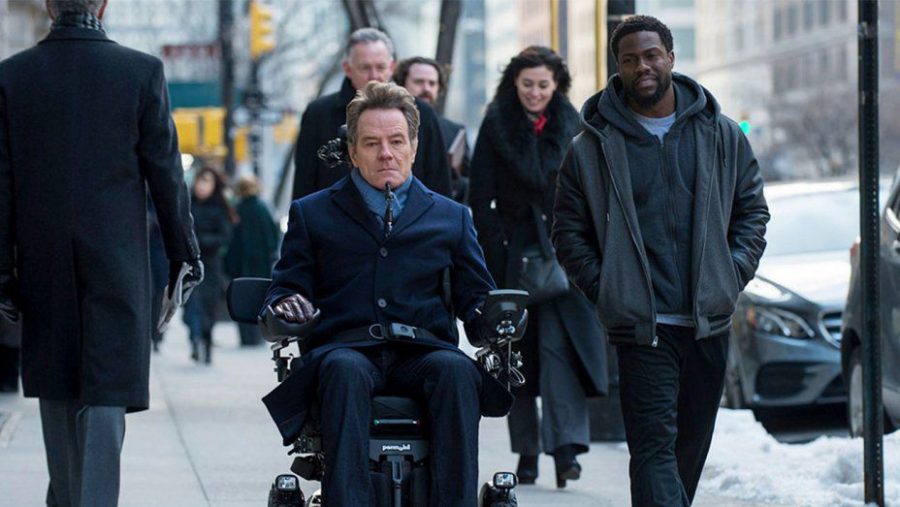REVIEW: Hart and Cranston can’t save a sloppy script in ‘The Upside’
FILM FACT BOX
Title: The Upside
Director: Neil Burger
Starring: Kevin Hart, Bryan Cranston, Nicole Kidman, Julianna Margulies, Aja Naomi King, Golshifteh Farahani
Writer: Jon Hartmere
Runtime: 123 minutes
“The Upside” opens with a befuddling scene that signifies many of the film’s greater problems.
The film begins on Dell Scott (Kevin Hart) driving a very expensive car through New York City, speeding through the streets, nearly hitting someone head-on in a quasi-action sequence. The whole first scene is shot like one of Matthew McConaughey’s infamous Lincoln commercials, which marks the first of many times the film can’t decide on a tone.
Eventually, Dell is pulled over by police, and he bets his passenger, Phillip, (Bryan Cranston) $100 he can shake the cops. He does — momentarily — only to be corralled by the authorities about 15 seconds later. The police yank him out of the car and start to arrest him. The police scream at the passenger to get out of the car so they can do the same to him.
Dell angrily explains that Phillip is quadriplegic and having a seizure, and he’s speeding through the streets so he can get Phillip to the hospital. The camera cuts back to Phillip, who is obviously not having a seizure. He rolls his eyes, then purposefully starts foaming at the mouth to validate Dell’s story.
It’s an overtly crass way to open a movie that champions itself as a feel-good story about overcoming disability. Dell knowingly exploits Phillip’s paralysis. He gets away with it, but does the film?
The plot of the film is as follows: Dell is an ex-convict looking for work. Phillip is a crotchety millionaire struggling to find life’s purpose after a paragliding accident leaves him immobile from the neck down. He needs someone to take care of him, so he hires Dell, the “least qualified candidate,” in hopes he’ll honor Phillip’s wishes not to be resuscitated.
“The Upside,” based on Olivier Nakache and Éric Toledano’s 2011 French film, “The Intouchables,” sets up a promising premise with potential to gently explore topics like disability, race and poverty. Unfortunately, director Neil Burger and screenwriter Jon Hartmere try to take such a nuanced approach to these ideas that they end up not saying anything at all.
Instead, the film would rather spend its first hour showing us Dell and Phillip bonding over some inappropriate humor, mainly directed at Phillip’s executive, Yvonne, portrayed by a miscast Nicole Kidman. Dell’s jokes in the film, if they can be called that, are nothing more than lazy cheap shots dripping with misogyny.
It seems like Burger is setting Dell up for some sort of redemptive arc where he realizes it might be patronizing to proposition women he just met or call them “sweetie,” but that curve never comes. After everything Kevin Hart has been in the news for lately, it might be easy for him to continue on his crusade against sensitivity, but these jokes just aren’t funny.
On that same note, Bryan Cranston has found his name in headlines lately, under fire for portraying a quadriplegic person when Cranston himself is able-bodied. This, alone, should not be a problem. He’s an actor; it’s his job to portray someone he’s not.
The problem lies in the script, a screenplay that makes Phillip seem like such a pathetic sad sack that his life isn’t worth living, and that it takes someone who can walk to show him why he should want to be alive. His wife died of cancer years before, but after his accident, Phillip seems more upset by his lack of movement than the grief of losing her.
This culminates when he goes on his first date in years, which, of course, ends with Phillip having hot tea spilled in his lap. As he’s wheeled away, he says, almost to the camera, “I can’t feel anything,” in the most on-the-nose way possible, signifying his pain goes beyond the physical. The film’s problem is that it blames his sadness on his immobility, seemingly removing any hope for his eventual happiness because he can’t physically move.
It’s because of these mixed messages that “The Upside” fails at most of what it set out to do. It’s a comedy that isn’t funny, a drama that fails to hold any emotional stakes and an attempted feel-good story dragged down by archaic viewpoints on disability and masculinity. The charm isn’t there, and by the end of the film, it doesn’t feel like either Dell or Phillip has personally grown at all.
By the end of its bloated 123-minute runtime, the biggest “upside” you’ll feel is that the damn thing is finally over.
GRADE: C-
Cameron Hoover is a film critic. Contact him at [email protected].


